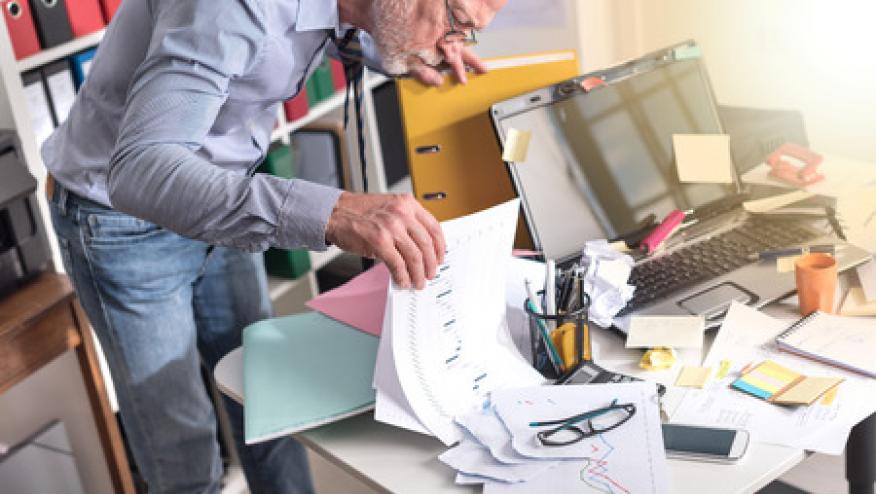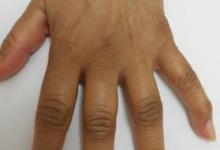What Does Your Desk Say About You? Save

I’m a firm believer that your desk space is a window to your soul, if not your neuroses.
This tested hypothesis stems from my time as a fellow. My first year fellow and colleague kept his desk meticulously sterile. It was so sparsely decorated and clean, he could be the poster child for minimalism. His desk reflected his personal traits of being orderly and disciplined.
This was in drastic contrast to our program director, who had papers and books strewn about and multiple half-filled coffee cups surrounding his desk. His chair was typically found in the middle of the room with his white coat thrown about like a kindergartener’s art project. This colorful, chaotic desk was the sign of his classic extroverted and creative personality.
Here are my observations from the natural habitats and home-base of rheumatologists.
- The recently-graduated fellow: In the wilds of the desk jungle you will find several books from “Netter’s” to “Secret’s in Rheumatology.” These desks generally have a landscape of post-it notes (possibly a harbinger of under developed technology skills?) and all sorts of “cheat sheets” (e.g., ICD10 codes, ophthalmology abbreviations, the RheumaKnowledgy card). A shiny, new “Trust Me I’m a Doctor” or some other inspirational quote/mug has a designated space reserved among the forest of print info. These are the perfect tools for practice building for the enthusiastic and energetic rheumatologist. Of note, those newly minted diplomas sure do look great on walls.
- The academic attending: These desks have extra hidden mugs, snacks for trainees, posters and models for teaching. Extra storage space is needed to accommodate books and training materials. An “interesting case” file can be found in an easily accessible folder. These desks are usually bigger, more distinctive and often unusual, much like their owners who tend to be big ego-big thinkers committed to the development of young minds. (Does the size the size of the desk reflect the ego of the physician)?
- The research attending: study protocols overwhelming the space are complemented by piles of as well as articles, monographs, and actual hard copies of journals across these desks. In contrast, this desk can also adorned with a light settling of dust if the attending spends the majority of their time at the bench or turned to the CRT writing grants. They may even have a traditional surveyor style desk to ensure time and space for creative thought and discovery. The accompanying weirdness of a researcher may be exemplified by buried slide rule, dead/dying plants or a lava lamp.
- The private practice attending: Much like the proverbial zebra, these desks may be difficult to truly classify. In my current habitat, I sit between two very different desks. To my right, is my “rheumatechologist.” He surrounds himself with tech gadgets and always has multiple windows open on multiple monitors – as if he/she is running the latest NASA mission. He’s my go to for all difficult patient questions and always knows what to do when technology fails. By contrast, my partner to my left is my quadruple threat sage rheumatologist/mom/researcher/purveyor of fine snacks and hilarious anecdotes. She’s my go to for life’s questions, nuanced patient management and a good restaurant/book recommendation. Her desk is more varied; she has pictures of her beautiful family, study protocols, birthday reminders, and a reference sheet for important phone numbers. I surround myself with two Zebra pens (self -proclaimed pen snob, here), my water bottle, business cards, little gifts from my patients, my orange theory fitness calendar, and a running “to do” list.

All three of our desks are very different. There seems to be an ample hand sanitizer, Kleenex, holiday left overs, memorable patient letters and entertainment tools (coloring books, toys, markers) for children who visit the office.
The private practice desk can range from very messy to very neat, spatially opened or closed. There are variations of the theme of each desk are specific to each rheumatologist who inhabits it’s often bumpy, sometimes smooth, terrain.
The best part of all of these desks remains is the personalities and proclivities of the provider who occupies the seat.
What does your desk look like and does it reflect your personality? Send us your picture and confessions at info@rheumnow.com.










If you are a health practitioner, you may Login/Register to comment.
Due to the nature of these comment forums, only health practitioners are allowed to comment at this time.